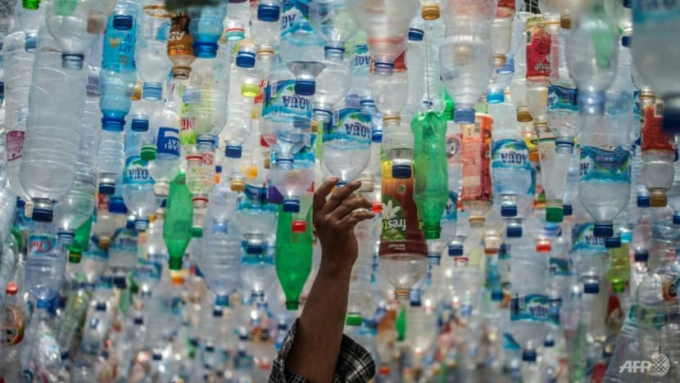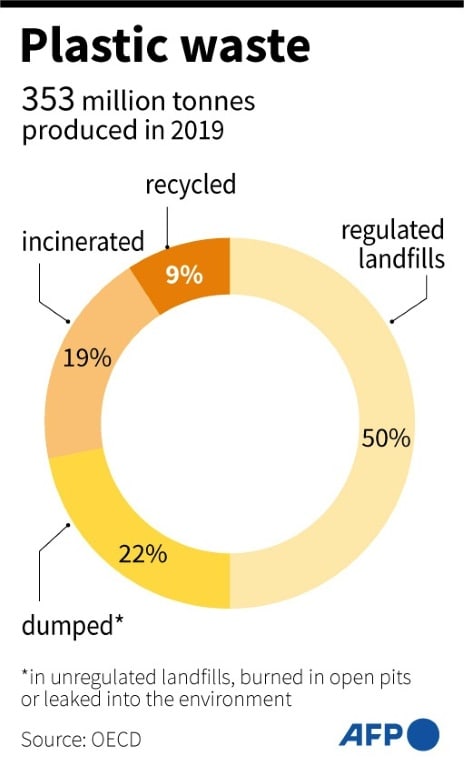May 16, 2025 | 02:05 GMT +7
May 16, 2025 | 02:05 GMT +7
Hotline: 0913.378.918
May 16, 2025 | 02:05 GMT +7
Hotline: 0913.378.918

Plastics contributed 3.4 per cent of global greenhouse emissions in 2019, the report said. Photo: AFP
A new report by the Organisation for Economic Co-operation and Development report found that 460 million tonnes of plastics were used last year, the number nearly doubling since 2000.
The amount of plastic waste had more than doubled during that time to 353 million tonnes, the Paris-based OECD said.
"After taking into account losses during recycling, only nine percent of plastic waste was ultimately recycled, while 19 per cent was incinerated and almost 50 per cent went to sanitary landfills," it said in its Global Plastics Outlook.
"The remaining 22 per cent was disposed of in uncontrolled dumpsites, burned in open pits or leaked into the environment."
The COVID-19 pandemic saw the use of plastics drop by 2.2 per cent in 2020 compared to the previous year. However single-use plastics rose and overall use is "projected to pick up again" as the economy rebounds.
Plastics contributed 3.4 per cent of global greenhouse emissions in 2019, 90 per cent of it from "production and conversion from fossil fuels", the report said.
In the face of rampant global warming and pollution, "it will also be crucial that countries respond to the challenge with coordinated and global solutions", OECD Secretary-General Mathias Cormann said in the report.
The OECD proposed a series of "levers" to address the issue, including developing the market for recycled plastics, which only represent 6 per cent of the total - largely because they are more expensive.
It added that new technologies related to decreasing the environmental footprint of plastics was only 1.2 per cent of all innovation concerning the product.
While calling for "a more circular plastics lifecycle", the OECD said that policies must also restrain overall consumption.
It also called for "major investments in basic waste management infrastructure", including €25 billion (US$28 billion) a year to go towards efforts in low and middle-income countries.
PLASTIC TREATY TALKS
The report comes less than a week before the UN Environment Assembly begins on Feb 28 in Nairobi, where formal talks are expected to begin on a future international plastics treaty, the scope of which will be discussed.

Shardul Agrawala, the head of the OECD's environment and economy integration division, said Tuesday's report "further accentuates the need for countries to come together to start looking towards a global agreement to address this very important problem".
Asked about the priorities of the treaty to be discussed in Nairobi, she said that "there is an urgent waste management problem which is responsible for the bulk of the leakage to the environment".
"But we should not limit our focus just to the end of pipe solutions, there is a greater need in the long term to forge international cooperation and agreement towards alignment of standards," she told an online press briefing on Monday.
In a survey published on Tuesday by polling firm Ipsos for the World Wildlife Fund, 88 per cent of respondents stressed the importance of an international treaty to combat plastic pollution.
In the 28 countries surveyed, 23 per cent of the respondents said such a treaty was "fairly important", 31 per cent said it was "very important" and 34 per cent found it "essential".
(AFP)

(VAN) Fourth most important food crop in peril as Latin America and Caribbean suffer from slow-onset climate disaster.

(VAN) Shifting market dynamics and the noise around new legislation has propelled Trouw Nutrition’s research around early life nutrition in poultry. Today, it continues to be a key area of research.

(VAN) India is concerned about its food security and the livelihoods of its farmers if more US food imports are allowed.

(VAN) FAO's Director-General emphasises the need to work together to transform agrifood systems.

(VAN) Europe is facing its worst outbreak of foot-and-mouth since the start of the century.

(VAN) The central authorities, in early April, released a 10-year plan for rural vitalization.

(VAN) Viterra marked a significant milestone in its carbon measurement program in Argentina, called Ígaris, reaching 1 million soybean hectares measured.